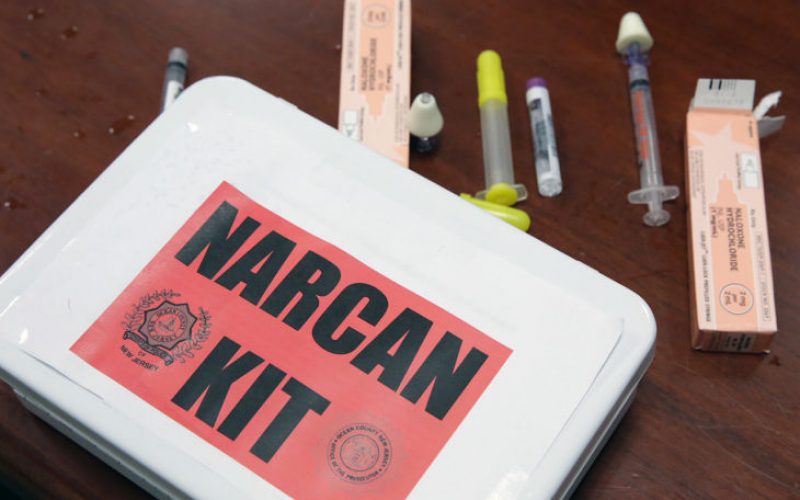Fayetteville to equip police with anti-opioid medication
ASHTON ELEY
aeley@nwadg.com
The Fayetteville Police Department is the latest in the state to send its officers out on the streets with Narcan to save the life of someone overdosing on opioids.
Narcan is the brand name of the anti-opioid medication naloxone, which counteracts the effects of a narcotic overdose.
Through donations, the department will have enough Narcan kits to put one in every patrol car, spokesman Cpl. Dallas Brashears said. The department will be using the brand’s nasal spray, he said. The police policy took effect Jan. 16.
Drug overdose deaths in the state went from 153 in 2011 to 401 in 2016, a 162 percent increase, according to the Centers for Disease Control and Prevention.
Opioids killed more than 42,000 people in 2016 in the U.S., more than any year on record. About 40 percent of all opioid overdose deaths involve a prescription opioid, according to the CDC.
Nationally, there has been a push to get Narcan into the hands of police and first responders, Brashears said.
At least one Arkansas police department has been carrying naloxone since late 2015, but many others started in 2017 after Gov. Asa Hutchinson announced a standing order allowing Arkansas-licensed pharmacists to initiate naloxone therapy.
This includes ordering, dispensing and/or administering naloxone, along with any necessary supplies for administration, to people who are at risk of experiencing an opioid-related overdose, or who are family members, friends or others who are in a position to assist a person at risk of experiencing an opioid-related overdose, according to the order.
The order was issued in accordance with Act 284 of 2017.
Rogers Police recently approved a special order also allowing officers to administer Narcan, spokesman Keith Foster said.
Benton County passed a policy in September allowing first responders and law enforcement officers, among others, to administer an opioid antagonist to someone they believe is experiencing an opioid related overdose.
Bentonville Police do not have a policy of Narcan program, spokesman Gene Page said. They rely on the fire department, which distributes and carries the medication on the ambulance, he said.
“Their fast response times combine with the minimal distribution in our city, tabled our need for a secondary distribution program,” Page said. “If the need increases in the future, we can always look into a possible policy.”
Springdale Police do not yet have a policy, but are working on something very similar to Fayetteville’s, spokesman Lt. Jeff Taylor said.
The Washington County Sheriff’s Office does not have a written policy but deputies carry the drug, spokeswoman Kelly Cantrell said. All uniformed patrol and transport deputies began carrying it after they received training in August.
“They have been advised to use it if they feel it is necessary. They can administer it to themselves or to the general public,” Cantrell said. “Our deputies have attended training and we were advised there are no adverse effects from giving it to someone who doesn’t need it, so there’s no harm done.”
Officers may need to use the anti-opioid medication on a fellow officer if someone is accidentally exposed to a drug. Police are especially wary after several national stories of police and emergency personnel being hospitalized after exposure to fentanyl, a prescription drug and a potent synthetic opioid.
Brashears said Fayetteville’s policy is more of a proactive measure to get ahead of the problem, though police see prescription drug abuse and some intentional overdoses in the area.
“We wanted to be prepared in case we do see an increase in our area, so we went ahead and adopted this policy to help save lives,” he said.
This policy also will allow officers to further use training many have already undergone. Administering Narcan has become a standard part of CPR training.
“Our officers are quite often the first responders,” Brashears said. “We want them to be able to identify a potential overdose and be able to administer Narcan while we are waiting for the fire department and EMS to get there to do more extensive procedures.”
Training will be mandatory for all sworn personnel, evidence division employees and crime scene technicians, according to the policy.
In addition to learning how to spot the signs of an overdose, those administering the spray must be ready to respond if the person becomes violent when they start to come out of it, said Cpl. Greg Dawson with the Fayetteville Police.
The risk of liability for a law enforcement officer or department resulting from naloxone administration is low, according to the U.S. Department of Justice, Bureau of Justice Assistance.
In nearly all states, including Arkansas, the liability risk is further reduced by laws that provide law enforcement officers, as well as their employers, with additional layers of protection from lawsuits.
According to Arkansas’ Naloxone Access Act, “a person acting in good faith who reasonably believes that another person is experiencing an opioid-related drug overdose may administer an opioid antagonist” and is immune from civil and criminal liability.






